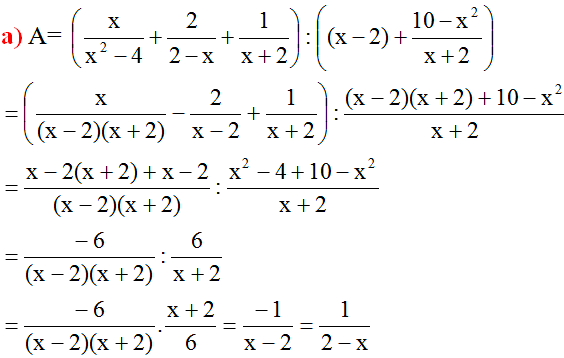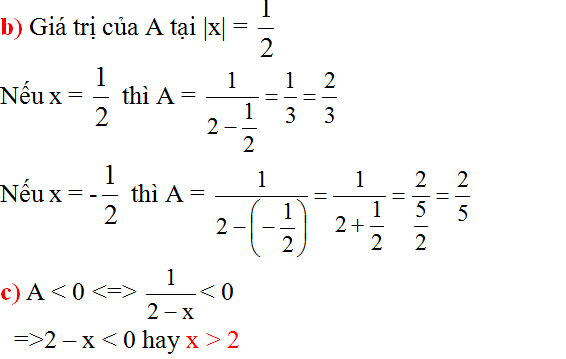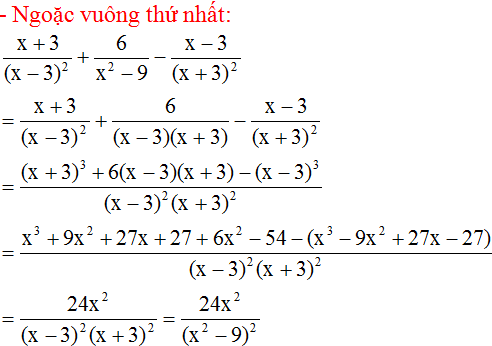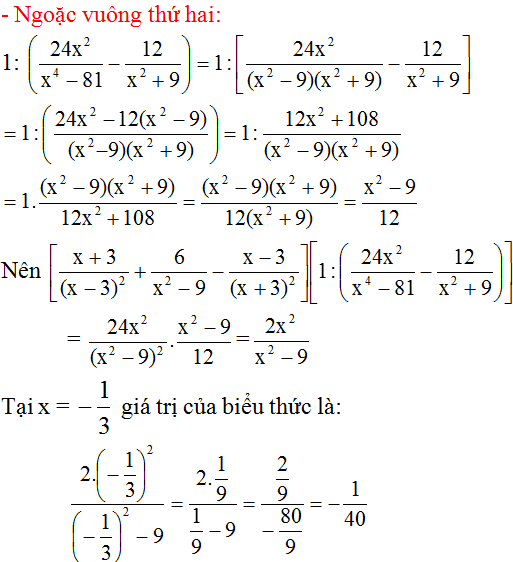Hãy nhập câu hỏi của bạn vào đây, nếu là tài khoản VIP, bạn sẽ được ưu tiên trả lời.

Lời giải của bạn Nhật Linh đúng rồi, tuy nhiên cần thêm điều kiện để A có nghĩa: \(x\ne\pm2\)

a,ĐK: \(\hept{\begin{cases}x\ne0\\x\ne\pm3\end{cases}}\)
b, \(A=\left(\frac{9}{x\left(x-3\right)\left(x+3\right)}+\frac{1}{x+3}\right):\left(\frac{x-3}{x\left(x+3\right)}-\frac{x}{3\left(x+3\right)}\right)\)
\(=\frac{9+x\left(x-3\right)}{x\left(x-3\right)\left(x+3\right)}:\frac{3\left(x-3\right)-x^2}{3x\left(x+3\right)}\)
\(=\frac{x^2-3x+9}{x\left(x-3\right)\left(x+3\right)}.\frac{3x\left(x+3\right)}{-x^2+3x-9}=\frac{-3}{x-3}\)
c, Với x = 4 thỏa mãn ĐKXĐ thì
\(A=\frac{-3}{4-3}=-3\)
d, \(A\in Z\Rightarrow-3⋮\left(x-3\right)\)
\(\Rightarrow x-3\inƯ\left(-3\right)=\left\{-3;-1;1;3\right\}\Rightarrow x\in\left\{0;2;4;6\right\}\)
Mà \(x\ne0\Rightarrow x\in\left\{2;4;6\right\}\)

điều kiện của x để gtrị của biểu thức đc xác định
=>\(2x+10\ne0;x\ne0:2x\left(x+5\right)\ne0\)
\(2x+5\ne0;x\ne0\)
=>\(x\ne-5;x\ne0\)
vậy đkxđ là \(x\ne-5;x\ne0\)
rút gon giống với bạn nguyen thuy hoa đến \(\dfrac{x-1}{2}\)
b,để bt =1=>\(\dfrac{x-1}{2}=1\)
=>x-1=2
=>x=3 thỏa mãn đkxđ
c,d giống như trên

a) P xác định \(\Leftrightarrow\hept{\begin{cases}2x+10\ne0\\x\ne0\\2x\left(x+5\right)\ne0\end{cases}\Leftrightarrow x\ne\left\{-5;0\right\}}\)
b) \(P=\frac{x^2+2x}{2x+10}+\frac{x-5}{x}+\frac{50-5x}{2x\left(x+5\right)}\)
\(P=\frac{x^2\left(x+2\right)}{2x\left(x+5\right)}+\frac{2\left(x-5\right)\left(x+5\right)}{2x\left(x+5\right)}+\frac{5\left(10-x\right)}{2x\left(x+5\right)}\)
\(P=\frac{x^3+2x^2+2x^2-50+50-5x}{2x\left(x+5\right)}\)
\(P=\frac{x^3+4x^2-5x}{2x\left(x+5\right)}\)
\(P=\frac{x^3+5x^2-x^2-5x}{2x\left(x+5\right)}\)
\(P=\frac{x^2\left(x+5\right)-x\left(x+5\right)}{2x\left(x+5\right)}\)
\(P=\frac{\left(x+5\right)\left(x^2-x\right)}{2x\left(x+5\right)}\)
\(P=\frac{x\left(x-1\right)}{2x}\)
\(P=\frac{x-1}{2}\)
c) Để P = 0 thì \(x-1=0\Leftrightarrow x=1\)( thỏa mãn ĐKXĐ )
Để P = 1/4 thì \(\frac{x-1}{2}=\frac{1}{4}\)
\(\Leftrightarrow4\left(x-1\right)=2\)
\(\Leftrightarrow4x-4=2\)
\(\Leftrightarrow4x=6\)
\(\Leftrightarrow x=\frac{3}{2}\)( thỏa mãn ĐKXĐ )
d) Để P > 0 thì \(\frac{x-1}{2}>0\)
Mà 2 > 0, do đó để P > 0 thì \(x-1>0\Leftrightarrow x>1\)
Để P < 0 thì \(\frac{x-1}{2}< 0\)
Mà 2 > 0, do đó để P < 0 thì \(x-1< 0\Leftrightarrow x< 1\)

Câu trả lời sai là:
(C) Giá trị của Q tại \(x=3\) là \(\dfrac{3-3}{3+3}=0\)
Do ĐKXĐ của phương trình
\(Q=\dfrac{x^2-6x+9}{x^2-9}\) là \(x\ne\pm3\)

\(P=\left(\frac{x-1}{x+3}+\frac{2}{x-3}+\frac{x^2+3}{9-x^2}\right):\left(\frac{2x-1}{2x+1}-1\right)\)\(\left(đkcđ:x\ne\pm3;x\ne-\frac{1}{2}\right)\)
\(=\left(\frac{\left(x-1\right).\left(x-3\right)+2.\left(x+3\right)-\left(x^2+3\right)}{x^2-9}\right):\left(\frac{2x-1-\left(2x+1\right)}{2x+1}\right)\)
\(=\frac{x^2-4x+3+2x+6-x^2-3}{x^2-9}:\frac{-2}{2x+1}\)
\(=\frac{-2x-6}{x^2-9}.\frac{2x+1}{-2}\)
\(=\frac{-2\left(x+3\right)}{\left(x-3\right).\left(x+3\right)}.\frac{2x+1}{-2}\)
\(=\frac{2x+1}{x-3}\)
b)\(\left|x+1\right|=\frac{1}{2}\Leftrightarrow\orbr{\begin{cases}x+1=\frac{1}{2}\\x+1=-\frac{1}{2}\end{cases}\Leftrightarrow\orbr{\begin{cases}x=-\frac{1}{2}\left(koTMđkxđ\right)\\x=-\frac{3}{2}\left(TMđkxđ\right)\end{cases}}}\)
thay \(x=-\frac{3}{2}\) vào P tâ đc: \(P=\frac{2x+1}{x-3}=\frac{2.\left(-\frac{3}{2}\right)+1}{-\frac{3}{2}-3}=\frac{4}{9}\)
c)ta có:\(P=\frac{x}{2}\Leftrightarrow\frac{2x+1}{x-3}=\frac{x}{2}\)
\(\Rightarrow2.\left(2x+1\right)=x.\left(x-3\right)\)
\(\Leftrightarrow4x+2=x^2-3x\)
\(\Leftrightarrow x^2-7x-2=0\)
\(\Leftrightarrow x^2-2.\frac{7}{2}+\frac{49}{4}-\frac{57}{4}=0\)
\(\Leftrightarrow\left(x-\frac{7}{2}\right)^2-\frac{57}{4}=0\)
\(\Leftrightarrow\left(x-\frac{7}{2}-\frac{\sqrt{57}}{2}\right).\left(x-\frac{7}{2}+\frac{\sqrt{57}}{2}\right)\)
bạn tự giải nốt nhé!!
d)\(x\in Z;P\in Z\Leftrightarrow\frac{2x+1}{x-3}\in Z\Leftrightarrow\frac{2x-6+7}{x-3}=2+\frac{7}{x-3}\in Z\)
\(2\in Z\Rightarrow\frac{7}{x-3}\in Z\Leftrightarrow x-3\inƯ\left(7\right)=\left\{\pm1;\pm7\right\}\)
bạn tự làm nốt nhé
a, \(\left(\dfrac{x^2-4x+3+2x+6-x^2-3}{\left(x+3\right)\left(x-3\right)}\right):\left(\dfrac{2x-1-2x-1}{2x+1}\right)\)
\(=\dfrac{-2x+6}{\left(x+3\right)\left(x-3\right)}:\dfrac{-2}{2x+1}=\dfrac{-2\left(x-3\right)\left(2x+1\right)}{-2\left(x+3\right)\left(x-3\right)}=\dfrac{2x+1}{x+3}\)
b, \(\left|x+1\right|=\dfrac{1}{2}\Leftrightarrow\left[{}\begin{matrix}x=\dfrac{1}{2}-1\\x=-\dfrac{1}{2}-1\end{matrix}\right.\Leftrightarrow\left[{}\begin{matrix}x=-\dfrac{1}{2}\left(ktmđk\right)\\x=-\dfrac{3}{2}\end{matrix}\right.\)
Thay x = -3/2 ta được \(\dfrac{2\left(-\dfrac{3}{2}\right)+1}{-\dfrac{3}{2}+3}=\dfrac{-2}{\dfrac{3}{2}}=-\dfrac{4}{3}\)










Đề sai rồi bạn